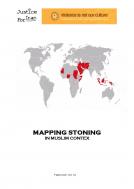Mapping Stoning in Muslim Contexts
| Attachment | Size |
|---|---|
| JFI & VNC - Mapping Stoning in Muslim Contexts.pdf | 425.2 KB |

Women Living Under Muslim Laws, the Violence is not our Culture Campaign, and Justice for Iran are pleased to announce the release of a new publication: Mapping Stoning in Muslim Contexts. This report locates where the punishment of stoning is still in practice, either through judicial (codified as law) or extrajudicial (outside the law) methods.
Historically, stoning has been used in many religious and cultural traditions as a form of community justice or capital punishment: the ancient Greeks stoned people judged to be prostitutes, adulterers or murderers; in Jewish written (Torah) and oral law (Talmud), stoning is a prescribed method of execution for crimes such as murder, blasphemy or apostasy. Although there is no mention of stoning in the Qur’an, the practice has come to be associated with Islam and Muslim cultures. Laws that rendered stoning as a legally-sanctioned punishment emerged with the revival of political Islam during the late 20th and early 21st centuries. However, stoning also occurs in contexts where there is no legal precedent for the practice.
While there are few documented instances of stoning, it still poses a serious threat to both women and men living in Muslim contexts today. Sexual relationships outside of marriage, along with same-sex relations regardless of marital status, are criminalized in most codified interpretations of Islamic law, or Shari’a. Any sexual relationship outside a legal marriage is considered a crime punishable according to the individual’s relationship status: 100 lashes if unmarried and death by stoning if married. Over the past few decades, human rights and women’s rights activists have worked hard to challenge this perspective and bring an end to such cruel and brutal punishments.
As this report shows, women are far more likely to be the victims of stoning. Even though no law exists that prescribes stoning as a punishment exclusively for women, misogynist and discriminatory practices and interpretations of religious laws make women far more likely than men to be found guilty of “adultery".
Other recommended readings on stoning:
- Stoning is Not Our Culture: A Comparative Analysis of Human Rights and Religious Discourses in Iran and Nigeria.
- No Justice in Justifications: Violence Against Women in the Name of Culture, Religion, and Tradition.
- “Frequently Asked Questions about Stoning”
- Control and Sexuality: The Revival of Zina Laws in Muslim Contexts
- “Stoning and Islam”
- “Stoning and Human Rights”
- “The ‘End of Stoning’: Islamic Republic Style”


